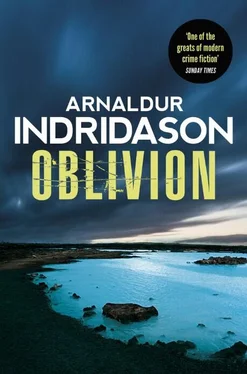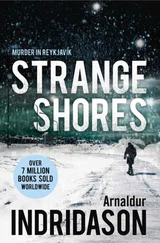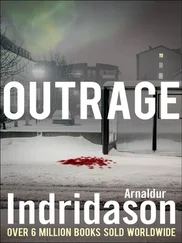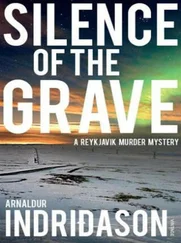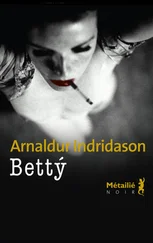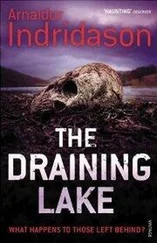‘Do you remember what else you talked about?’
‘Yes, I remember it well. Every detail. Every word she said. She told me they had a good gramophone but almost no decent records. And she asked if I could lend her any. I said I was afraid I didn’t own any records. The only music I listened to was on the radio. She said they never played anything for young people and I agreed. The State Broadcasting Service put on nothing but symphonies. Still does.’
Rasmus attempted to smile but it resulted in no more than slight tremors of his lips that revealed a hint of teeth. He was recovering his composure after this rude invasion of his property. Erlendur had succeeded in calming him.
‘Was that all?’ said Erlendur. ‘You only talked about music?’
‘Yes, that was all.’
‘Is it right, what I’ve heard, that you were the victim of an attack several years after Dagbjört vanished?’
‘Where did you hear that?’ asked Rasmus, surprised.
‘From a man I know who used to live in Camp Knox.’
‘I’m not sure I want to talk about it,’ said Rasmus hesitantly.
‘No, all right,’ said Erlendur, keen not to put too much pressure on the man.
‘It was an unpleasant experience.’
‘I can believe it.’
‘A couple of hooligans. They stank of the camp. I was walking home from town and they followed me as if I was some kind of freak. Started insulting me. I’d never seen them before but they seemed to know all about me. That I used to live with my mother and so on. That she was dead. I begged them to leave me alone but they wouldn’t listen. They pushed me into an alleyway and hit me. Stole my bag. Then ran away. I was left lying there, covered in blood, but managed to struggle home somehow.’
‘Did the police catch them?’
‘Police? I didn’t bother the police. My mother would have said there was no point making a fuss about a little thing like that. People are just envious of our sort, you see.’
‘Tell me more about your conversation with Dagbjört. You discussed the party she was having that evening, and music. That’s all?’
‘I remember it so well; she wanted to get hold of some new records,’ said Rasmus. ‘There weren’t as many foreign records around then. Not like now, all that terrible racket.’
‘And how was she planning to “get hold of” them?’
‘She was hoping a friend of hers would bring along some brand-new records from America. The girl had got them through her cousin who worked on the base. Dagbjört wanted him to buy some for her too.’
‘So, he worked on the base, did he? This cousin?’
‘Yes, that’s what she said.’
‘Did he live there too?’
‘She didn’t say.’
‘Do you know what he was called?’
‘No, all I knew was that he was the cousin of one of her friends.’
‘You didn’t mention this to the police after Dagbjört went missing?’
‘The police?’
‘Didn’t you think you were in possession of an important piece of information?’
‘What information?’ asked Rasmus, looking confused.
‘I don’t think this has come out before. That she might have been intending to meet this man.’
‘I wouldn’t know.’
‘Didn’t it occur to you after she vanished?’
‘No, I can’t say it did. She must have mentioned it to other people too. If she was intending to buy records from this man. What’s so remarkable about that? It can hardly have been much of a secret.’
‘You’re right,’ said Erlendur. ‘Not everything’s reported in the files. Perhaps it wasn’t significant.’
‘I wouldn’t have thought so,’ said Rasmus.
‘Did you watch Dagbjört and her friends having their party? From your house?’
Rasmus nodded.
‘And when the party was over and her friends had left, Dagbjört went up to her room to get ready for bed and saw you peeping through the curtains, watching her undress?’
‘Yes,’ Rasmus admitted reluctantly.
‘You don’t like visitors much,’ said Erlendur, trying to meet Rasmus’s shifty eyes and read the truth from them. ‘Especially not from the police. You don’t report it when you’re beaten up. You talk to Dagbjört shortly before she vanishes but don’t tell anyone. Maybe you were afraid your secret would be exposed?’
‘My secret?’
‘After all, if it had emerged that you used to spy on her in the evenings you might have been suspected of far worse after she went missing. You couldn’t take the risk. Unless you were afraid of something quite different. Have you got other secrets, Rasmus? Something you’re hiding here in your house?’
‘I didn’t touch her,’ protested Rasmus. ‘I could never have hurt her. You’ve got to understand that. Never. Never. Never.’
Caroline still hadn’t made contact by the time Erlendur returned to CID headquarters. Marion was sitting by the phone but said it was unlikely they would hear from her any time soon, given that she had fobbed them off with a false number. There was no telling what she was thinking or what her next move would be. It seemed obvious to Marion that she didn’t want any further dealings with the Icelandic police for now and that she would get in touch when she felt the need. Erlendur countered that she could be in real danger if Kristvin’s death was linked to Wilbur Cain, CIA transport aircraft and arms dealing.
‘Hadn’t we better go back out there?’ said Erlendur. ‘Do something?’
‘You’re right. There’s no way I can sit here and wait for her to make contact if there’s the slightest chance she’s in danger,’ said Marion. ‘The question is, should I go alone this time?’
‘Hmm, second thoughts, I’m not sure she’d want that. I’m sure she’d let us know if she uncovered something major.’
‘Still, it couldn’t hurt to take a trip out there,’ said Marion, standing up. ‘I’ll try to be discreet. You wait by the phone and talk to her if she calls. What have you been up to, by the way? Ringing from payphones, charging around town.’
‘Dagbjört,’ said Erlendur.
‘Making any headway?’
‘Not sure. Could be.’
Erlendur outlined what he had found out since he discovered the diary pages in Dagbjört’s room. He described his visit to Rasmus Kruse who had admitted spying on Dagbjört across the garden in the evenings. And his encounter with Vilhelm at the bus station. And the news about the friend’s cousin who worked on the base and supplied the latest records from America and possibly a variety of other sought-after items that teenage girls would have coveted in the post-war years.
‘You mean the cousin may have been using that as bait?’ said Marion.
‘It crossed my mind.’
‘Of course there was nothing in the shops after the war,’ said Marion. ‘We had import restrictions and acute shortages for years, right around the time your girl went missing.’
Erlendur was aware of the import restrictions in those days. Special licences were required to ship any kind of goods into the country. Not even a holey sock could be brought in unless a rationing clerk had approved the request. Long queues would form if people got wind of some new product arriving in the shops; they were prepared to camp outside all night if necessary, waiting for the doors to open. There was a flourishing black market too and corruption was rife. The restrictions spawned all sorts of smuggling rackets and under-the-counter trade.
‘And profiteering from the army was at its height,’ said Erlendur.
‘You can say that again.’
‘There’s a passing reference to the gramophone records in the files containing interviews with the girls who were at Dagbjört’s party, but the police saw no point in following it up. They never made any connection between this man and Dagbjört — perhaps for a good reason. Perhaps they didn’t know each other and never met. But it would be interesting to talk to him. If he’s still alive.’
Читать дальше
